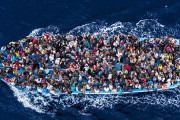GERMAN STATE RADIO PROMOTES ILLEGAL KOSOVO STATE
Dateline: 13th February 2005
INTRODUCTION by Rodney Atkinson. Pursuing the classic continuity of German Foreign Policy throughout the 20th century (under imperialist Kaiser, Nazi Hitler or Eurostatist Kohl and Schroeder) German politicians, having supported and financed the illegal break up of the sovereign State of Yugoslavia, are now working for a break away Kosovo and the hegemony of the successors to their Nazi era allies (the Kosovo Liberation Army). It has been established by the UN and international law that Kosovo is a province within a sovereign Serbia. But having started the Yugoslav War by illegally recognising Croatia as a separate State such legal niceties do not concern the German political class which has for years sought to reward its murderous allies, the Kosovo Albanian KLA (which it armed and financed during the 1980s and 1990s). It was a KLA leader who was pleased to welcome their EU and NATO allies in the 1999 war as “the fascist armies”!
There are few greater evils in the world than the new conquest of the Balkans by the ruthless German State – unless it is the quiescent, supine ignorance of the British and American Governments as everything they fought for in two world wars is systematically undone. By surrendering control to the EU (German Europe) the British and Americans have put their former anti fascist allies at the mercy of their and our historic enemies (Germany, the Vatican and European Fascism). The proof is in the Balkans today.
Report by the German Journalists of www.german-foreign-policy.com dated 6
February 2005
Translated 7 February 2005 by Edward Spalton
.
A PIECE OF LAND WITH NO STATUS
BERLIN/PRISTINA German members of parliament from all the main parties are
making the case for the early secession of the southern Serbian province of
Kosovo in broadcasts by the Albanian language service of German state
radio, “Deutsche Welle” (equivalent of the BBC World Service – ed). In an interview with the station, which is the most popular among the Albanian-speaking population, the Social Democrat foreign affairs spokeswoman, Uta Zapf, stated that they had “for many years” supported the conferment of state sovereignty on the district.
A plan by the “International Crisis Group”, supported by Berlin, provides for the attainment of sovereign powers by the provincial government in Pristina from the middle of next year. Whilst German foreign policy has worked towards this goal for years, critics foresee a “domino effect in the region” and warn of a mafioso “gangster state” in Kosovo
Since the beginning of January Deutsche Welle’s Albanian service has
repeated to its listeners in several programmes that Kosovo should soon
be separated from the Serbian state. Contrary to the truth, German state radio
has stated that this concerns “a piece of land without status”.(1)
Whilst the Free Democrat foreign policy spokesman, Rainer Stimmer, was stating a minority opinion that Kosovo wanted to be directly ruled by Brussels (2), members of the main German parties were of the opinion that the province should become a sovereign state. “I have the impression that it was always clear that Kosovo should go its own way” said Elmar Brok (The Christian Democrat MEP favoured by the BBC!) (3), chairman of the foreign policy committee of the European parliament.
Authoritative German foreign policy experts have positioned themselves in response to Deutsche Welle for the final debate over the secession of Kosovo. On 24th January the “International Crisis Group” (ICG) produced a plan which laid down a timetable for the separation of the province from Serbia. According to this, the UN Secretary General should nominate a “Special Envoy” as soon as possible. He would immediately begin
discussions over a “Kosovo Accord” and thereby proclaim the final secession of the
province. Up to Autumn this year, the “Kosovo Accord” and a constitution for the new state should be available for negotiation. According to the ICG both texts should be endorsed by an international conference at the end of 2005 before the people of Kosovo are permitted to vote on the constitution early in 2006. By the middle of 2006 Pristina should receive sovereign powers but continue to be controlled by a “Kosovo Monitoring Mission” (4)
Precautions
Berlin’s foreign policy has long worked for the separation of Kosovo from the Serbian state. As early as November 2002, the UN administrator of Kosovo, the German Michael Steiner, demanded an end to Serbian sovereignty over the area (5). In July 2003 Steiner decreed a separate criminal law system for the southern Serbian province. At the same time he made a free trade agreement with Albania which created conditions for reducing the economic dependence of Kosovo on the remaining territories of the Serbian
state.(6)
The forthcoming secession of Kosovo must also be secured militarily. The defence and foreign policy spokesman of the Christian Democrats/Christian Social Union in the German parliament, Christian Schmidt, said it would be necessary “to take precautions” in Kosovo, in view of the beginning of negotiations on secession. The Bundeswehr contingent, already in position, should be reinforced.(7)
Berlin’s foreign policy activities have been reinforced by the Albanian service of Deutsche Welle. As a spokeswoman for the station confirmed, the audience for the German broadcasts “increased massively” before and during the NATO invasion. A representative survey from 2001 established that 97% of Kosovo’s population knew Deutsche Welle. It was top of the listening figures for all foreign programmes. Around 65% of the Albanians (but only 21% of Serbs) listened at least weekly. According to the survey, 96% of
Albanians expressed “affection” for Germany but 66% of the Serbian population
expressed “aversion” (8).
Albanian Kosovo – A Gangster State
Critics fear a “domino effect in the region” if the secession of Kosovo becomes a reality and counsel against early negotiations.(9) Its separation will be regarded as a precedent for further separatist movements (such as Chechnya (10). The ambition for a “Greater Albania” will also spur attempts at an Anschluss to include parts of Macedonia(11) (and Montenegro and the Sanjak of Novi Bazar – ed).
Friedhelm Frischenschlager (former OSCE director of democratisation for Kosovo) has stated “as always, Kosovo will be a powder keg”. Observers point not least to the desolate economic and social situation in the province and the unbroken dominance of mafia structures which are, as ever, connected to the UCK (Kosovo Liberation Army). (Note that most of the trafficking of prostitutes and drugs in London is now dominated by Albanian gangs given refuge by Tony Blair as if they were victims – ed)The Oldenburg sociologist, Michael Daxner, warns “Kosovo is in danger of becoming a confirmed gangster
state” (12)
References
1) Eine schnelle Unabhaengigkeit fuer Kosovo? Deutsche Welle Fokus Ost-Suedost 03.02.2005
2) s.dazu Sonderwirtschaftszone
3) Kosovo-Debatte im Europaparliament: Deutsche Welle Fokus Ost-Suedost 27.01.2005
4) International Crisis Group: Kosovo: Toward FInal Status Report No 161 24 January 05
5) s.dazu Deutsher Verwalter stellt territoriale Integritaet Jugoslawiens in Frage
6) s. dazu Berliner Beute und Nationbuilding
7) Union: Im Kosovo Vorsorge treffen: Frankfurter Allgemeine Zeitung 28.01.2005
8) Kosovo 2001: Spitzenplatz fuer Deutsche Welle – Fast alle Kosovaren kennen DW; Deutsche Welle 14.01.2005
9) Experten: Keine Loesung des Kosovo-Status 2005; Der Standard 14.01.2005
10)s.dazu Modell Kosovo
11)s.dazu Zum Scheitern verurteilt und Entweder-Oder
12)”Nach wie vor Pulverfass”; Die Presse 14.10.2005















